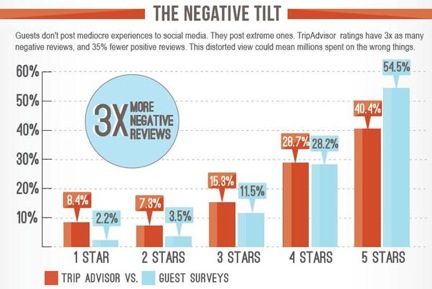Hotel customer feedback based on social media is inaccurate when compared to statistically significant survey research, according to an analysis by Market Metrix.
Online reviews from TripAdvisor are severely skewed toward the negative, Market Metrix found, as there were nearly 300% more negative responses (1- and 2-star ratings) when compared to survey research, and positive responses (5-star ratings) were underrepresented by 35%.

Social media data is questionable for several reasons, Market Metrix said. First, the pressure to have positive online reviews has created a market for “promotional reviews,” where bogus feedback is bought and sold.
Second, the number of reviews produced for a given property on social media is low, according to Market Metrix. An aggregate view of the top 10 review sites produces an average of only about 15 reviews per property per year — not enough data to represent a clear and balanced picture of the customer experience.



